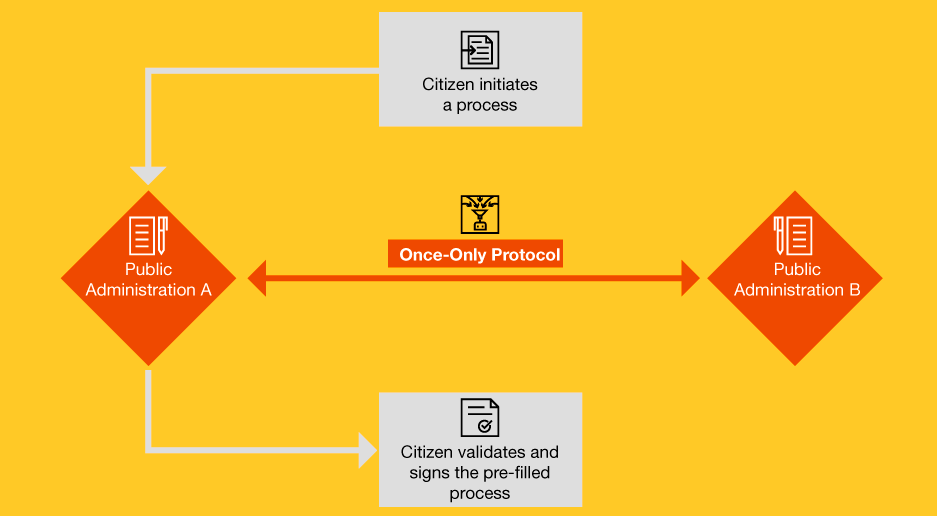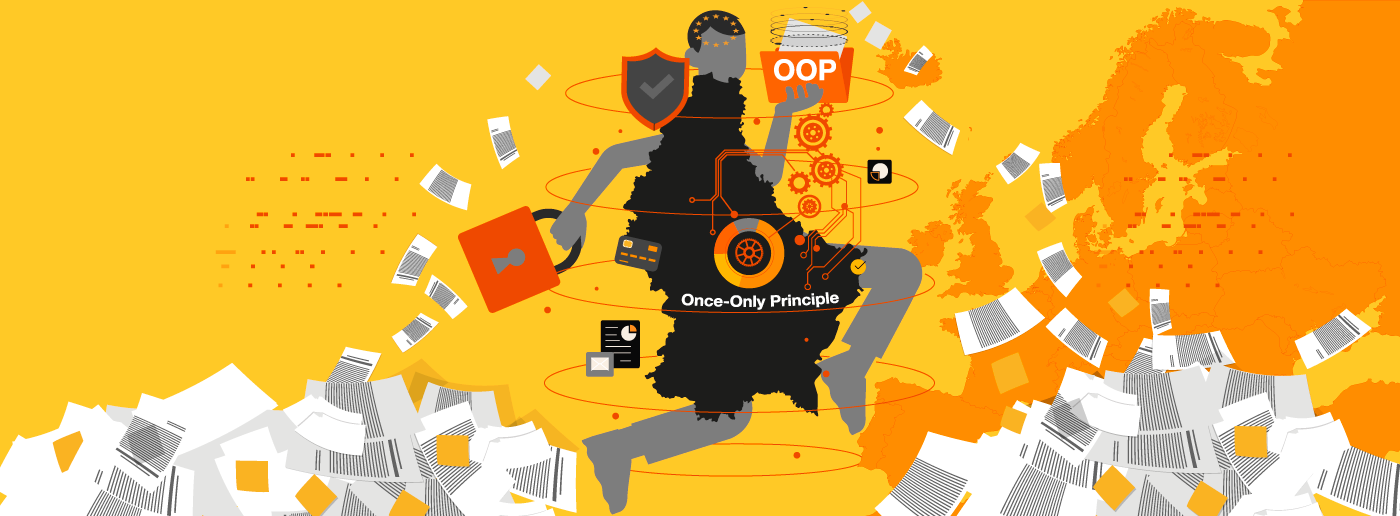Written in collaboration with Marie Christine Adam, Consultant Government & Public Sector, PwC Luxembourg
Imagine you’ve just found a wonderful little house on the outskirts of Luxembourg City. The price is right, the neighbourhood peaceful, and it feels like the ideal place to call home. There’s just one downside—it needs some renovations. ‘No big deal,’ you think. You’re eager to create your personal haven and nothing can stop you.
Wanting to make the most of available support, you head to MyGuichet, Luxembourg’s official portal for administrative procedures and services, to check if you qualify for state aid. Good news—you do. Determined to get everything right, you meticulously gather, complete, and submit all the required documents, expecting a smooth and straightforward process.
A few weeks later, a letter arrives from the Ministry of Housing, requesting additional paperwork—tax certificates from previous years. To obtain them, you must formally submit yet another set of forms and documents, this time to the Luxembourg Inland Revenue (Administration des Contributions Directes, or ACD).
If you’ve recently changed communes, things get even more complicated. Now, multiple departments are involved—none of which seem to communicate efficiently with each other. Weeks go by, delays pile up, and what should have been a straightforward process begins to feel like navigating a bureaucratic maze.
Don’t have time to read the whole blog entry? Then watch our “Blog in 1 minute” video for a quick summary of its main points:
This scenario is based on a real story shared by Jacques-Félix Wirtz, Director in Government and Public Sector at PwC Luxembourg, during PwC Luxembourg’s TechTalk episode, ‘The One on Simplifying Public Services with the Once-Only Principle’. To hear more about this experience, and how it ties into the broader topic of administrative simplification, listen to the episode here:
Feeling lost and confused by all the endless paperwork bears an uncanny resemblance to the infamous curfew pass A38 scene from Asterix and the Twelve Tasks. In the film, Asterix and Obelix find themselves trapped in a Kafkaesque nightmare—endless forms, confusing regulations, and unhelpful clerks who don’t seem to communicate with each other. This is an experience all too familiar for all of us navigating administrative procedures today.
This bureaucratic odyssey highlights a broader issue: the endless repetition of providing the same information to multiple public authorities. Not only does this create frustration for citizens, but it also places an unnecessary strain on administrative resources.
Enter the Once-Only Principle (OOP)—an e-government concept designed to address this very challenge.
In this blog, we explore the OOP, highlighting its benefits for individuals, businesses, and public administrations. We also examine Luxembourg’s progress in implementing it and provide key recommendations for successful adoption.
What is the Once-Only Principle?
The Once-Only Principle aims to ensure that citizens, institutions, and companies provide certain standard information to public authorities—you guessed it—only once. With robust data protection measures and explicit user consent, administrations can then securely reuse and exchange this data among themselves, eliminating redundant submissions.
This principle is a key pillar of the European Union’s Digital Single Market Strategy and plays a crucial role in the EU’s eGovernment Action Plan (2016–2020). Its goal is to modernise public administration, enhance cross-border interoperability, and streamline digital interactions between governments, citizens, and businesses.
The benefits for individuals and business owners….
For individuals and businesses, the Once-Only Principle significantly simplifies administrative procedures. Instead of repeatedly submitting the same documents, applicants can rely on public authorities to retrieve necessary information themselves. This accelerates processing times and reduces costs, eliminating the need for certified copies or redundant paperwork.
Beyond efficiency, the OOP enhances transparency and control. In some EU Member States, citizens will have access to a dedicated data protection dashboard, allowing them to track how their data is used, manage permissions, and adjust access as needed.
In Luxembourg, concerns have been raised about the traceability of data exchanges between administrations. Some have questioned how these processes could be made more transparent—whether through an access registry or by continuing displaying detailed information on MyGuichet. How this will unfold remains to be seen.
The OOP could be especially valuable for cross-border workers and business owners, enabling seamless document sharing between member states. This would help reduce bureaucratic obstacles and facilitate smoother interactions with public administrations.
Ultimately, this principle could strengthen European integration, boost economic cooperation, and create new opportunities for businesses by cutting administrative costs and streamlining operations.
…and public administrations
Public administrations also stand to gain significantly from the Once-Only Principle. By eliminating redundant information requests, authorities can reduce manual paperwork, ease administrative burdens, and improve data accuracy, minimising errors, and inconsistencies.
The approach also strengthens cooperation among European countries by harmonising data exchange practices across borders. With fewer repetitive tasks, civil servants can focus on delivering higher-quality services, such as providing tailored advice and support to citizens.
However, OOP adoption varies across EU Member States. Some countries store collected data in a centralised database, while others implement a decentralised model, ensuring that once data is submitted, it can be securely shared across different administrations—even if multiple repositories exist.
A few nations take a hybrid approach, combining both methods. Estonia is a frontrunner in OOP implementation, using it across administrative processes, from health records to business registrations. Meanwhile, Belgium and the Netherlands have already introduced platforms to facilitate public access to digital government services.
Where are we in Luxembourg?
In Luxembourg, the government has recognised the OOP as a key enabler of more efficient administrative processes. The 2023-2028 coalition programme emphasises the creation of an efficient, digitalised, and transparent public sector, with the OOP at the core of its simplification efforts.
In the June 2024 State of the Nation address, the government announced plans to develop a centralised and digitised platform aligned with the OOP framework, set to be implemented within the next 24 months.
To support this initiative, a draft law introduced in June 2024 (draft law number 8395) will establish the legal framework for data sharing between ministries and public administrations. The legislation mandates that public entities and communes collaborate and exchange information internally, reducing the need for citizens to repeatedly submit the same data.
Key provisions of the draft law include:
- Article 9: Citizens cannot be asked to provide the same information again if it is already available within another public entity or can be retrieved from one.
- Article 10: Public entities must inform individuals about the personal information being requested and obtain their certification confirming that the data collected from other entities is accurate.
- Article 12: Public entities are required to promptly identify the information and personal data they can obtain from other public entities.
- Article 13: Before any data exchange, involved entities must formalise an agreement detailing the purpose of the processing, categories of data to be exchanged, and the individuals to whom the data belongs.
These measures aim to enhance transparency, accuracy, and reliability in administrative processes.
The process behind the Once-Only-Principle

Source: The Luxembourg Government
Making the Once-Only Principle a reality
While having a (draft) law is great, the real challenge lies in implementation. Here are seven factors that should be carefully considered:
1. Streamlining processesEffective implementation begins with optimising existing processes. Relying solely on technology isn’t enough; the system needs to be designed to prevent errors from the outset. Digital tools, including artificial intelligence (AI), can assist in identifying and correcting potential mistakes early in the process, helping reduce delays and enhance efficiency.
A significant challenge is ensuring that data is captured and stored correctly. This requires a shift in mindset: investing time and resources upfront can pay off by making systems faster, more reliable, and more efficient over time.
A key aspect of this transformation is ensuring data security, as the exchange of sensitive personal data must happen in a secure and compliant environment. Technologies like encryption and anonymisation are essential to guarantee information is shared only as permitted by law, such as under the General Data Protection Regulation (GDPR).
However, GDPR’s principle of purpose limitation—which restricts the use of personal data to the specific purpose for which it was collected—raises questions about OOP’s compatibility with existing data protection frameworks. These concerns need to be carefully addressed to ensure compliance.
Countries like Estonia have demonstrated the potential of a digital-first approach, where digital channels and tools become the default mode of interaction and service provision, replacing paper-based processes, in-person visits, and manual interventions. Luckily, Luxembourg seems to be moving in the same direction.
Beyond technological advancements, it’s crucial to create a robust legal framework. It should enable the secure and efficient exchange of data while ensuring full compliance with relevant regulations and standards. For the OOP to reach its full potential, coordination and harmonisation between governments, especially across borders, if successfully established, is fundamental.
Digital transformation doesn’t happen overnight. Luxembourg is laying the groundwork step by step, starting small and refining each part of the system. Over time, the integration of digital tools will enhance efficiency, security, and ease of use across public administrations, making processes smoother for both citizens and businesses.
The OOP’s successful implementation requires all administrative systems to communicate effectively. However, not all systems are at the same level of technical development, which can hinder seamless data exchange. To overcome this, governments must actively support administrations in upgrading and adapting their systems.
As Luxembourg continues its journey towards digital excellence, these incremental steps are paving the way for a more streamlined and accessible public administration. By prioritising data security, adopting a digital-first approach, and building a robust legal framework, the foundation is being laid for a comprehensive transformation.
The road ahead to simplifying public administration
The Once-Only Principle is set to transform how governments interact with citizens and businesses—there’s no doubt about that. The real question is how the transformation will unfold.
Much like turning that charming little house into your dream home, implementing the OOP requires careful planning, strategic decisions, and steady progress. Each small step taken in streamlining processes, ensuring data security, and creating the right legal framework brings us closer to a more efficient and user-friendly system.
Just as you would renovate a house piece by piece, the digital transformation of public administrations is unfolding gradually. And while the journey may take time, the end goal is clear: a future where administrative burdens are reduced, and both citizens and businesses can focus on what truly matters.
As Luxembourg and other European countries continue to strengthen their digital infrastructure, the OOP has the potential to redefine administrative procedures—making them more seamless, modern, and accessible than ever before.
Visit our webpage to see how we support Luxembourg’s public sector.
What we think

The implementation of the Once-Only Principle is not just a digital upgrade—it is a fundamental shift towards a more efficient, citizen-centric public sector. By eliminating redundant data requests, we reduce inefficiencies, streamline processes, and enhance trust in public services. We are eager to support Luxembourg’s public sector in making this vision a reality.
The Once-Only Principle is more than just about escaping ‘The Place That Sends You Mad’ in the Twelve Tasks of Asterix—it’s about simplifying lives, strengthening trust, and shaping a truly digital future. As Luxembourg embraces this transformation, the vision of a seamless, digital-first public service is closer than ever.


